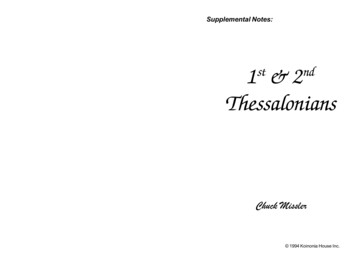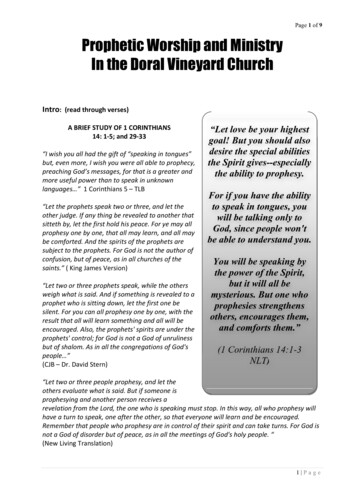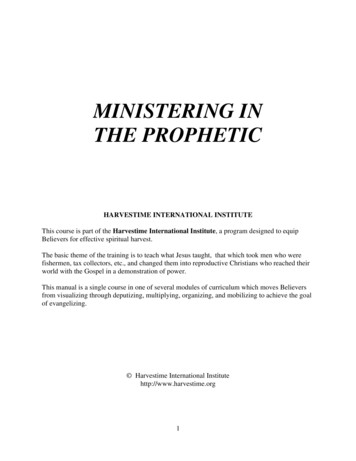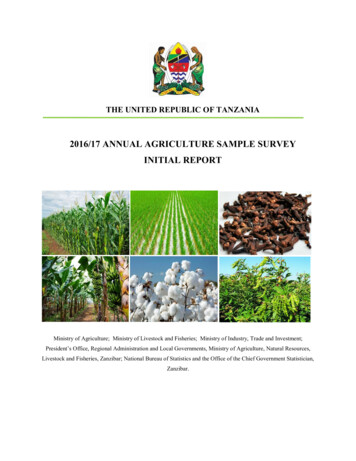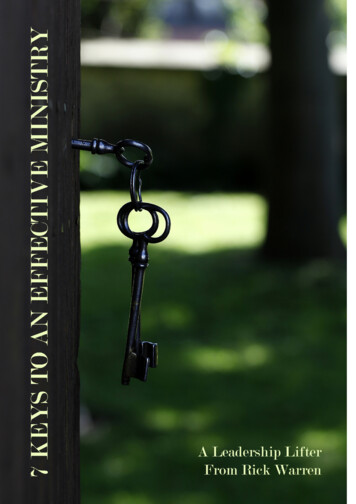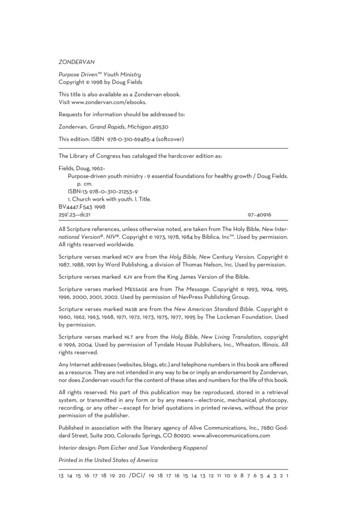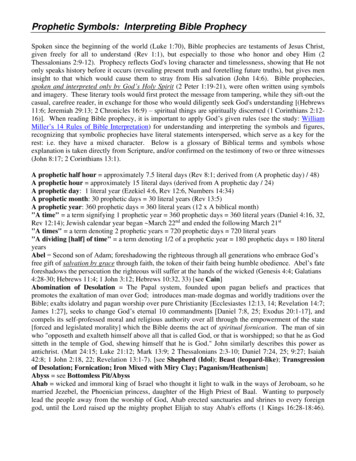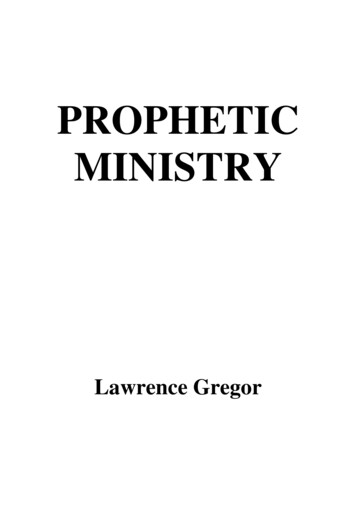
Transcription
PROPHETICMINISTRYLawrence Gregor
PROPHETIC MINISTRYCopyright 2014 by Lawrence GregorALL RIGHTS RESERVEDAll scripture references are from the Authorized King James Version ofthe Bible.Worldwide Pentecostal Outreach is a non-profit missionary societydedicated to ministering the Word of God to all people groupsworldwide.Published by:Lawrence Gregor,Worldwide Pentecostal Outreach,PO Box 3080, Thornton. NSW 2322 Australia.1ST Printing June, 2014Printed for worldwide distribution.2
Author: Rev. Lawrence Gregor, President ofWorldwide Pentecostal Outreach,PO BOX 3080, Thornton, N.S.W 2322 Australia .Audited by Pastor Tom Knapp, Perth, Australia3
Table of ContentsIIntroductionp.4IIConformity to the Baptism in the Holy Spiritp.6IIIOur Increased Capacityp.9IVProphetic Heritagep.20VThe Ordered Lifep.23V1Prophetic Unctionp.33VIIThe Prophetic Officep.36VIIIThe Prophetic Mantlep.38IXThe Prophet's Functionp.42XInspiration and Revelationp.46XIThe True Prophetp.52XIIProphetic Utterancep.54XIIIProphetic Releasep.56XIVNew Testament Prophetsp.60XVConclusionp.664
INTRODUCTIONThe office and ministry of the Prophet continues to be asunpopular today as it was in the Old Testament periods.Even today Prophets are not always considered asnecessary and valued ministers. In Old Testament timesProphets, on occasion, were expulsed from theirhometowns and forced to minister elsewhere. (Amos7:10-13)Nevertheless, the Bible teaches that the Office of a Prophetis one of the five-fold ministries, and as such is anessential part of the body of Christ. The Bible recordsmany were affronted by the teachings of those whoministered the Word of God with a strong propheticanointing. Jeremiah, for instance, was constantlypersecuted; John the Baptist lost his head; Stephen wasstoned to death; John the Revelator was exiled. Even todayApostles and Prophets continue to be misunderstood.However, I have found that the greater the spiritual hungerin Pentecostal churches the greater the acceptance of theProphetic ministry. In many nations this acceptance hasencouraged an increase in the number of specializedschools for the training of prophets.Yet, worldwide, there is still a tremendous need for greaterunderstanding of the Prophet and his true function. Allspirit-filled ministers and their colleagues need to developgreater revelatory capabilities for the disciplines that willultimately give them the intuitive cutting edge when beingprophetically used of God.5
I believe God is pleased to see increasing numbers of menand women willing not only to apprehend the disciplinerequired to bring accurate prophecy, but the dedication totake the Word of the Lord too many nations.The church of Jesus Christ is at the threshold of theimminent return of the Lord. God is equipping the churchwith a greater number of apostles and prophets. Theseministries ultimately will be used in helping prepare theBride of Christ for the Bridegroom—the Christ, who is tocome. They are often used in works of restoration, andhelp in raising the body of Christ to its full potential. AProphet is usually inspired by heavenly and visionarydirection, and, coupled to his strong Word-based messagesand use of the gifts of the Holy Spirit are reasons enoughfor engaging such a ministry in the work of God.Although this book does not cover all aspects of the gift ofprophecy and the office of the Prophet, there is enoughinformation to challenge those hungering to be used ofGod prophetically. Such will be a blessing to the body asthey receive greater degrees of impartation of thisanointing.6
CONFORMITY TO THE BAPTISM OF THEHOLY SPIRITThe baptism in the Holy Spirit is as important in our livestoday as it was in Jerusalem on the day of Pentecost. (Acts2) When Jesus spoke of the coming of the Baptism of theHoly Spirit, “not many days hence” (Acts 1:5), Hecommanded those assembled to wait for the “promise ofthe Father” (Acts 1:4). When believers are filled with theHoly Spirit, they will speak with unknown or new tongues.This is the same experience the believers had on the day ofPentecost. (Acts 2:4) As it was then, so it is now! Thosewho experience this “personal Pentecost” will be given anew ability to serve the Lord more effectively. (Acts 1:8)The new tongues must accompany the experience; for thisis the proof of being completely in-filled with or havingbeen baptized or immersed with the Holy Spirit. If thespeaking of unknown tongues is not evidenced when thebeliever is prayed for, then the Holy Spirit infilling isincomplete. When the believer is absolutely filled, theHoly Spirit within will overflow in new tongues. Thisexperience is for all believers, including Ministers andthose holding leadership positions.When a believer receives the Holy Spirit baptism, hereceives the power to live and work for God. The Biblesays in Acts 1:8, "You shall receive power after the HolyGhost has come upon you." On the day of Pentecost, thispower was given for the purpose of serving God. "Youshall be my witnesses both in Jerusalem, all of Judea, andthe uttermost part of the earth." As it was then, so it isnow. God's vision is a world vision. Jesus said, "Go ye7
into all the world and preach the gospel to every creature."God often gives this larger world vision when He gives usHis Holy Spirit power. This power and boldness is betterexpressed through the gifts of the Holy Spirit. FurtherBiblical proofs are as follow.The gift of Speaking in Unknown Tongues was firstexperienced on the Day of Pentecost when the disciplesfelt the power of the infilling of the Baptism of the HolyGhost. (Acts 2:4).In Mark 16:17, just prior to His ascension, the LordJesus Christ had referred to this experience as a sign.The unknown tongues were languages not learned.However, they had a characteristic of spiritual revelationwith freshness. Jesus had prophesied that the believerwould speak in unknown tongues in His name, the nameof Jesus.Speaking in unknown tongues is also recorded in Acts10:44, when the Gentiles first received the Baptism ofthe Holy Ghost.The believers in Ephesus spoke in unknown tongues andprophesied when they received the Baptism of the HolySpirit (Acts 19:6). The gift of speaking in unknowntongues is therefore an important sign showing that thebeliever has received the Baptism of the Holy Ghost.The Apostle Paul often spoke in tongues.1Co 14:18 I thank my God, I speak with tongues morethan ye all:8
Jude encouraged all believers to build up the inner man byspeaking in tongues or as he put it “praying in the HolyGhost”.Jude 1:20 But ye, beloved, building up yourselves onyour most holy faith, praying in the Holy Ghost,1Co 2:4 And my speech and my preaching was not withenticing words of man's wisdom, but indemonstration of the Spirit and of power:Paul’s preaching demonstrated the power of the Spirit ofGod: he no longer relied on his academic knowledge (Php3:5), but now spoke the wisdom of God. (1 Cor 2:13)1Co 2:7 But we speak the wisdom of God in a mystery,even the hidden wisdom, which God ordained beforethe world unto our glory:How did Paul access these mysteries of God with thehidden wisdom that was God-ordained?I believe it was because he spent hours praying in“tongues”. (1 Cor 14:18)1Co 14:2 For he that speaketh in an unknown tonguespeaketh not unto men, but unto God: for no manunderstandeth him; howbeit in the spirit he speakethmysteries.9
OUR INCREASED CAPACITYThe power of the Holy Spirit increases our personalcapacity to work for God. Imagine fitting a larger wattagelight bulb into a lamp socket. The result is increased light.It is the same socket and the same source of power. Thedifference is the light bulb has a greater wattage capacity.Because of the increased capacity, it uses more power andproduces stronger light giving greater illumination. Thedarkness is greatly reduced. This is what happens whenwe receive the power of the Holy Spirit. We now have thecapacity to work for God in a greater way. The power ofGod is now flowing through us because we willinglyreceived His Holy Spirit power. Our vessel now has agreater capacity or ability in Christian service. As thispower of the Holy Spirit is used in greater measure, so theamount of "gross darkness" of this world is dissipated bythe increased anointing upon us. When Spirit-filledbelievers become more aware of spiritual darkness, thentheir vision for ministry should increase. It is God's desireto use us beyond our individual communities. Those whosee the need of the world as God sees it often becometravelling ministries.God gives the increase and we move in greater faith, stepby step. As we take these steps, the gifts of the Holy Spiritflow through us. Then, as we take yet further faith strides,the Holy Spirit uses us in even greater ways, enhancingour ministry effectiveness. If we refuse to accept thepower of the Holy Spirit, we cripple that effectivenesswhether at home or abroad. In order for God to release youin the prophetic gifting, you must be absolutely filled withthe Holy Spirit. You must speak freely in new tongues,10
with “rivers of living water” flowing out of your innermostbeing. (John 7:38)Joh 7:38 He that believeth on me, as the scripture hathsaid, out of his belly shall flow rivers of living water.Holy Spirit baptism does not mean we speak with newtongues as a conclusion. As far as our new capacity isconcerned this is just the beginning of a greater journey offaith. Our new tongues should be used as a tool to buildup our inner man every day. (1 Cor 14:4a)1Co 14:4 He that speaketh in an unknown tongueedifieth himself.The Spirit-filled believer should speak or pray in tonguesevery day. If we do not exercise our physical bodies, wecan lose physical conditioning and deteriorate physically.If we do not exercise our "new tongues", we may lose ourinner man spiritual-conditioning or ability. The speakingof new tongues keeps the river of the Spirit flowing in ourlives. When we keep it flowing, we will never feel "driedup" or spiritually withered.When believers speak in tongues in worship to God, theyare speaking mysteries to God. Many Christiansdisparage these mysteries because they believe it isintellectually unsound or maybe their friends told them itwas of the devil.But, the Apostle Paul himself encouraged all believers tospeak in tongues as private worship to God.1Co 14:5 I would that ye all spake with tongues,11
Paul also makes it clear about his own commitment tospeaking in tongues.1Co 14:18 I thank my God, I speak with tongues morethan ye all:1Co 14:2 For he that speaketh in an unknown tonguespeaketh not unto men, but unto God: for no manunderstandeth him; howbeit in the spirit he speakethmysteries.There is no limit to the praise and worship a believer cangive to God praying in unknown tongues, for this is theHoly Spirit praying through the believer. Some spiritfilled believers who worship in unknown tongues willexperience more “tongues” or languages being added tothem as they yield themselves more deeply to the HolySpirit. I find that the more unknown tongues I use as Ipray, the greater the Holy Spirit revelation is added untomy spirit. I have found that revelation and edification areby-products of the daily discipline of speaking intongues.1Co 14:4 He that speaketh in an unknown tongueedifieth himself.Edification of the Inner RiverTherefore the believer is building up his own spirituallife by speaking in tongues. A flow of the Holy Spirit isreleased in the believer’s life as he prays in unknowntongues, and sensitivity to the Holy Spirit is developed.12
Jesus said that out of the believer’s innermost bellywould flow rivers of living water. This river flow fromthe belly is due to the power of the Holy Spirit. (John7:38-39).Jude 20 encourages us to “pray in the Holy Ghost” foredification. This certainly includes praying in unknowntongues.Singing in unknown tongues is a different operation ofthe gift of Tongues; rather than speaking, one sings thetongue. Singing in Tongues is encouraged in 1Corinthians 14:15, where Paul says that he will “praywith the spirit . . . and sing with the spirit”.In Eph 5:19 Paul said, “but be filled with the Spirit;speaking to yourselves in psalms and hymns andspiritual songs.” Notice his request of being filled withthe spirit precedes the self-admonition of singing hymnsand spiritual songs.Praying in Tongues is a means to praying the perfectprayer of thanksgiving. (1 Cor 14:17)1Cor 14:17 says that those who pray in an unknowntongue give thanks well.Rom 8:26-27 says that “the Spirit helps our infirmities,for we know not what we should pray for as we ought.The Spirit makes intercession for the saints according tothe will of God”.Praying in unknown tongues causes us to pray accordingto the will of God. We can pray for needs unknown to13
us by our natural understanding as the Holy Spirit leadsus.1Co 14:39 Wherefore, brethren, covet to prophesy, andforbid not to speak with tongues.Paul gives us wise advice “Forbid not to speak withtongues”. He was speaking from experience.1Co 14:18 I thank my God, I speak with tongues morethan ye all:These verses of scripture encourage all Spirit-filledbelievers to be active in the use of speaking withunknown “Tongues”. This personal spiritual activity is amandatory inclusion in our daily times of prayer andworship. Consistency is what brings personal edificationand strengthening. “He that speaketh in an unknowntongue edifieth himself”.Vocalization of the Inner River FlowAll Holy Spirit gifts flow from the river of God.Prophecy being one of these vocal gifts flows from thisriver. The deeper the river, the deeper and more anointedis the prophecy. There are many passages of scripturethat encourage us into these greater depths. One is foundin Eze 47:1-6.Eze 47:5 for the waters were risen, waters to swim in, ariver that could not be passed over.14
The Gift of Interpretation of Tongues1. Before I mention the gift of Prophecy it is necessaryto briefly mention the gift of Interpretation of Tongues.The gift of Interpretation of Tongues is used with the giftof Tongues operating in the church. This gift may beexercised by anyone who wants to speak in tongues as agift in the midst of the congregation. In practice, this iswhat usually occurs. If a believer operates the gift ofInterpretation, he is also usually operating the gift ofTongues.2. The person who gives an Interpretation of Tonguesmay be different to the person who speaks out in the giftof Tongues. If there is no interpreter, then the gift ofTongues should not be used, as it does not edify thechurch.3. The gift of Interpretation is not a gift of translation.There is a difference. The interpreter is giving theessence of the gift of Tongues, and different believersmay vocalize the interpretation in different ways.Several believers may be aware that they have theinterpretation to a message in Tongues. When one givesthe interpretation it will not be a word for wordinterpretation that the other person would have spoken,although the essence of the message may be similar incharacter. The speaker needs to speak with at least ashigh an anointing as is flowing in the meeting. If thepraise is high, and the believer gives the message in asoft, indecisive voice, the anointing of the meeting islowered; those speaking need to seek to edify the church,moving from one level of anointing to an equal or higherlevel of anointing. They should not speak on and on so15
as to lose the unction of the Spirit. In other words; stopspeaking as soon as the anointing decreases. They mustbe aware of the timing protocols.Choose a suitable pause in the service to speak: e.g. afterpraise and worship subsides or after a song.Do not try to give a message in tongues in the midst ofhigh praises, in the middle of a song, or in the middle ofa sermon.Remember to use all gifts to strengthen or edify the bodyof believers.The Gift of ProphecyIt has been said that the gift of Tongues and the gift ofInterpretation of Tongues when added together equalsthe ministry of the gift of Prophecy in the Church. Aprophecy comes directly from God through one believer.The gift of prophecy is to be desired above the gift ofTongues used with the gift of Interpretation because ofthe greater edification of the Church (1 Corinthians 14:5)Usually the gift of Prophecy is manifested when anindividual has a strong desire to prophesy. The ApostlePaul made a very strong statement regarding prophesy.“Covet to prophesy” (1 Cor 14:39).1Cor 14:39 Wherefore, brethren, covet to prophesy,and forbid not to speak with tongues.16
Prophecy is never released from our minds. Realprophecy always flows from our spirit. Put simply, it isa belly experience (Jn 7:38).Joh 7:38 He that believeth on me, as the scripture hathsaid, out of his belly shall flow rivers of living water.Although this river from the belly has to do with the HolySpirit, I believe it also applies to prophecy. (Acts 19:6)Act 19:6 And when Paul had laid his hands upon them,the Holy Ghost came on them; and they spake withtongues, and prophesied.Prophecy, as a gift, can be received by all spirit-filledbelievers; for all spirit-filled believers receive the sameHoly Spirit baptism. Remember, prophecy like all of thenine gifts of the Holy Spirit is a work in progress.If there is little or no use of prophecy there can be noincrease in prophetic anointing!To operate the gift of prophecy effectively, our livesneed to be totally surrendered holy vessels before theLord. Note the verse in 2 Peter 1:21; the emphasis is on“holy men of God”. Prophesying without a surrenderedlife before the Lord will ultimately bring the gift intodisrepute.God uses the gift of prophecy to speak to the heart andsoul of mankind. There is a gushing forth of words asthe one prophesying is flowing under the anointing ofthe Holy Spirit. “Out of his belly shall flow rivers ofliving water.” (John 7:38). Prophesies need a river flow17
or spontaneous message flow. This message flow abilityis a mandatory characteristic of a mature Prophetic gift.The anointed flowing at the time of the operation of theprophetic gift enables a greater impartation to thosereceiving the prophecy, and helps to increase the level offaith.The Gifts of the Holy Spirit work together:(1 Cor 12:18) There is an interdependence of the gifts ofthe Holy Spirit. In the natural physical body, the variousmembers work and co-operate together to fulfill aphysical task. So it is with the workings of the gifts ofthe Holy Spirit. The exercise of one gift of the Spiritmay also require another gift for the total fulfillment ofthe purpose of God at that moment in time.1 Cor 12:4 states that there are diversities (ordifferences) of gifts, but the same Spirit. Over all, it isthe diversities of these gifts of the Holy Spirit moving incooperation that strengthens the body of Christ. (1 Cor12:19-25).The diversity or different spiritual gifts may beadministered in a variety of ways:1 Cor 12:5. For instance, prophecy may be spoken orsung. Healing may be accomplished by the laying on ofhands, or a spoken word, or even prayer over a clothwhich is later placed on the sick person. The word ofknowledge may be brought out in a prophetic utterance.Whichever way the gifts are used, it is the working of theHoly Spirit in and through Holy Spirit filled believers.18
MentoringDigesting the teachings of the word of God and fellowshipwith dedicated mature Spirit-filled ministers and believersare two ways of increasing faith. If we neglect the input ofGod’s Word and the fellowship with mature believers weremove some of the foundation stones necessary for theongoing building work of our faith. The Christian lifestyleis reflected in the actions and deeds of believers. The earlychurch believers had access to many apostles and prophetswho had a great fear of God. This resulted in a majoritywalking in the fear of God whilst witnessing signs andwonders. (Acts 2:43)Act 2:43 And fear came upon every soul: and manywonders and signs were done by the apostles.The apostles and those of like faith in Christ shared theirpossessions. This was not just a sharing of naturalblessings, for they went to the temple every day to sharetheir spiritual possessions: they were eyewitnesses of theinner workings of the gifts of the Holy Spirit. We mustshare our anointing and gifting with the body of Christ.God desires church growth as well as personal growth.The Lord added to the church daily. (Acts 2:47)When we study the word of God, we should endeavor toread it with the view of extracting truth that can be addedto our inner life. The Book of Acts is more than a historyof the early church. It should be our textbook for churchplanting, missions, revival, Christian and ministerialgrowth, and ministry impartation. In essence it is ourpersonal introduction to signs, wonders and miracles.19
There are many instances of Prophetic mentoring in theBible. Prophets in training learnt from older Prophets whohad been tested and proven by God. The story of Elisha,who faithfully served Elijah is one such example. Hecontended for a prophetic and miracle anointing and wasfinally rewarded when Elijah was caught up to heaven.2Ki 2:2 And Elijah said unto Elisha, Tarry here, I praythee; for the LORD hath sent me to Bethel. AndElisha said unto him, As the LORD liveth, and as thysoul liveth, I will not leave thee. So they went downto Bethel.2Ki 2:9 And it came to pass, when they were gone over,that Elijah said unto Elisha, Ask what I shall do forthee, before I be taken away from thee. And Elishasaid, I pray thee, let a double portion of thy spiritbe upon me.2Ki 2:14 And he took the mantle of Elijah that fellfrom him, and smote the waters, and said, Where isthe LORD God of Elijah? and when he also hadsmitten the waters, they parted hither andthither: and Elisha went over.20
PROPHETIC HERITAGEIn recent years, there has been a growing interest in familytrees and family origins. This is a particular increasingsignificance for people living in westernized nations,where families move from town to town, and even fromnation to nation. However, there are numerous websitesnow available to us. By searching into family histories,some have found interesting records; treasured memoirsand photographs that helped link them to their familyheritage.Armed with this available history, many have received asense of belonging and personal security, as they gainknowledge of their natural family origins.What would take place in our Christian lives if we had asimilar interest in our biblical family tree, whereby wefound some spiritual family origins?If we could trace the generations of our families, we mightbuild a family tree extensive enough to locate prophetsamong our ancestors. As we are all descendants of Adam,we must conclude that the canonical prophets and NewTestament apostles and prophets can be found somewherein our family tree.If you found a man of God in your family lineage, wouldthis make you consider the possibility of including the“prophetic” lifestyle and anointing in your ministry?21
Our modern technology may appear to give us a lifestylefar removed from Bible times. However, God says ofHimself, "He changes not." The 66 books of the Biblerecord the spiritual characteristics of these anointed menand women.When we study their lives realistically, we discover thatour lives and passions are not so different from the menand women of the Bible. The Bible gives a completefamily tree. It remains the only reliable history of allcultures spanning four thousand years BC and over 70years AD.Before we look at our prophetic genealogy, it is necessaryto establish from the Word of God that we are indeed theheirs of God and joint heirs with Christ. Our true spiritualheritage is stated in Romans 8:17.Rom 8:17 And if children, then heirs; heirs of God, andjoint-heirs with Christ; if so be that we suffer withhim, that we may be also glorified together.We know that the Bible is the inspired word of God, andthat the Bible is true. Therefore, the lineage of the Bible isour genealogy. The Bible tells us that we are sons of God."And if a son; then an heir of God through Christ." (Gal4:7)"And if ye be Christ's, then are ye Abraham's seed, andheirs according to the promise." (Gal 3:29)When we consecrated our lives to Christ, we had our sinsforgiven. We were granted the right to eternal life inheaven. Moreover, we were grafted into the family tree ofthe anointed Christ. This gives us the same ability as otherbranches on that tree to bear much fruit. Please consider22
the structure of a tree. Roots are at the bottom; thebranches are at the top. As we have been grafted to theanointed vine in Christ, we must seek to abide in Him inorder to be His anointed branches. (Jn 15: 5)Joh 15:5 I am the vine, ye are the branches: He thatabideth in me, and I in him, the same bringeth forthmuch fruit: for without me ye can do nothing.Having hidden this great scriptural truth within our hearts,we can continue our quest for a prophetic anointing. Icannot venture into every aspect of the origins of theprophet and prophecy. I will endeavor to show some ofthe truths in scriptural references that will help the readerto accept the requirements and challenges of propheticgifting and for those called to the Prophetic Office. TheProphetic minister wears a mantle; it is not just animpartation, but a calling with lifestyle disciplines. Onewears this mantle with responsibility and integrity. Withthis mantle, the believer can expect to be greatly used ofthe Lord.23
THE ORDERED LIFEA man or woman of God must be the custodian of theirown inner life.A prophetic voice is of little value without a propheticlifestyle.Moses is one of the great minds of the Bible. One of thereasons we should study the life and ministry of Moses isbecause he was prophetically greatly used of the Lord.God gave Moses specific instructions. With God'sguidance, Moses set in order the great institution of theprophetic anointing. This prophetic anointing, or mantle,has allowed men and women to declare the true word ofthe Lord down through the ages.Under God's direction, Moses directed the people of Israelto separate themselves from ungodly practices. Moses seta standard of godliness and holiness. (Deut 18:9-12) Thisordering or restructuring of lifestyle ensured that thepeople could clearly hear God's word without interference.God set a standard of behavior for the people of God. Herequired that the people put away all abominations so thatthey could clearly hear God's voice. Sensitivity to thevoice of God comes only when we order and discipline ourspiritual walk.God desires the same standard today. This standard ofgodliness guarantees that the people hear the true word ofthe Lord. (Deut 18:9,12,13)24
Deu 18:9 When thou art come into the land which theLORD thy God giveth thee, thou shalt not learn to doafter the abominations of those nations.Deu 18:12 For all that do these things are anabomination unto the LORD: and because of theseabominations the LORD thy God doth drive them outfrom before thee.Deu 18:13 Thou shalt be perfect with the LORD thyGod.Moses commanded Israel to separate itself from those whopracticed divination and occultism. God never gave areason for this separation, but it is evident that God desiresHis children acquire an inner perfection to hear and speakthe word of the Lord.Lifestyle of SeparationMoreover, this Holy Spirit power for service does notcancel the need for Christians to consider a lifestyle ofseparation from carnal things. We are called to a life ofseparation. The apostles' lifestyle of separation from thethings of the world became the Christian lifestyle of theearly church. When we maintain our separation from theworld we plug into a greater power source of His anointingin our lives.The second chapter of ACTS reveals some of thecharacteristics of this life of separation from worldliness.The Apostles' doctrine of the early church was a highstandard for all believers. These New Testament standardscontinue today.25
However they continued steadfastly in "doctrine (teaching)and fellowship". (Acts 2:42)God is totally committed to our spiritual welfare. Godalways gives his children the opportunity to hear His voicewith clarity. This clarity of hearing is a prerequisite forprophetic ministry.Moses had to order and yield his life to God before Moseswas convinced he could be used as a prophet of God. Thedifficulties and heartaches experienced in one's life mustnot be found as excuses to avoid serving God with agreater anointing.(Ex 3:11-14; Ex 4:1,10-15)Moses was an astounding and unusual prophet. Acharacter study of the life of Moses reveals many thingsthat he endured before being called and anointed to serveGod. He encountered difficulties, frustrations, personalanger and human weaknesses. Moses constantly battledhis slowness of speech. He was separated from hisbrethren and homeland.Elisha, a young Prophet in-training lived with and servedthe older prophet, Elijah. This experience gave Elisha aworking knowledge of the disciplines required for futureprophetic ministry. In contrast, there is no record ofMoses ever being tutored by a prophet. Moses had nopeers with whom he could fellowship on this level ofanointing. Moses learned directly from God.It was Moses' personal relationship with God that enabledhim to know what God wanted and expected from God's26
people. God used the life and ministry of Moses to give usa model for prophetic character and ministry. Godrequires of His people a high standard of conduct. SeeDeuteronomy chapter 18. "Thou shalt be perfect with theLord thy God." (Deut 18:13)God's ways are perfect. (2 Sam 22:31)God's work is perfect. (Deut 32:4)Some would say that this standard as required by God isnot possible. However, this high standard is possiblethrough Christ. When we receive Christ, we receive theholiness and perfection of God into our lives. If we walkwith the Lord and abi
Prophetic ministry. In many nations this acceptance has encouraged an increase in the number of specialized schools for the training of prophets. Yet, worldwide, there is still a tremendous need for greater understanding of the Prophet and his true function. All spi
